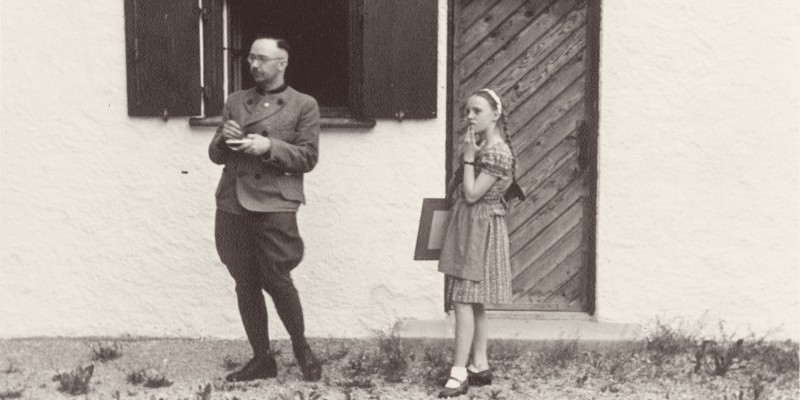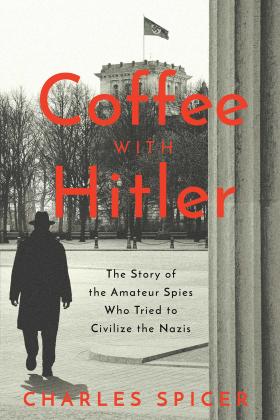In June 1934, when a war with Germany seemed a remote prospect, one of Philip Conwell-Evans’s English colleagues found himself in a Berlin suburban garden having dinner with Heinrich Himmler. Reichsführer of the Schutzstaffel (SS), the elite unit created as Hitler’s bodyguard, and already one of the most powerful men in Germany, Himmler would later be responsible for the conception, direction and execution of the Holocaust. The English colleague was Ernest Tennant OBE, a businessman, decorated Great War veteran and amateur butterfly collector.
Their host was Tennant’s closest German friend, Joachim Ribbentrop. A politically and socially ambitious businessman, the forty-one-year-old Ribbentrop, following a respectable military career in the Great War, had built a profitable business in wines and spirits. His wife, Anna Elizabeth (known as ‘Annelies’), who nurtured and indulged these ambitions, was the daughter of Otto Henkel, whose eponymous brand of sparkling wine earned him the sobriquet of Germany’s ‘champagne baron’. Their marriage brought Joachim money, social advancement and career successes that outpaced his modest talents, surprising both his few friends and many enemies.
Within two years, Hitler would send the quite unqualified Ribbentrop as his ambassador to London, before appointing him Germany’s foreign minister. At this point, he held no office in the Nazi hierarchy but had won favour by lending his villa for secret meetings between Hitler and established politicians at which alliances were made that led to the National Socialist Party (NSDAP) assuming power. The gauche new chancellor of Germany was impressed by the wine merchant’s veneer of cosmopolitan élan and trusted him for ad hoc advice on foreign affairs. That summer, after months of lobbying, Hitler finally appointed Ribbentrop to the grand sounding but inconsequential post of Special Commissioner of the Reich Government for Disarmament Questions.
The Ribbentrops made a handsome couple, photogenic and always immaculately dressed. Joachim favoured Savile Row suits while Annelies patronised the best dressmakers in Paris, Berlin and London. Elegantly furnished with French antiques set on Persian rugs, their villa was designed in the then-fashionable Arts and Crafts style, with a dash of Alpine kitsch. Important artworks hung from its walls, with pieces by Nazi-approved contemporary German painters displayed alongside leading French Modernists so as to raise the tone of their collection above their less sophisticated neighbours. Dahlem was a prosperous suburb favoured by the Berlin bourgeoisie and once home to successful German Jews, with many of whom Tennant’s hosts had once happily socialised. Now it was ever more popular with the National Socialist elite, including Himmler, who owned a villa nearby.
Outside, the villa boasted a swimming pool and tennis court set in a well-kept lawn, laid out in the English style Ribbentrop so admired. Scented by lilac flowers, dotted with fir trees and surrounded by rhododendrons, birches, willows and laburnum, it reminded another British visitor of Surrey or Sussex. To the rear, a series of French windows led on to a generous terrace, protected from the sun by a large canvas awning, where on the very warm Saturday evening of the last day of June, Ribbentrop hosted the dinner party.
Tennant had asked for Himmler to be included at the dinner, as he wished to lobby the head of the SS to release certain political prisoners being held without trial in the newly constructed concentration camps. Several hundred of these had sprung up in the previous two years to house illegally held ‘political prisoners’ under hideous conditions of extreme brutality – in what the Nazis dubbed ‘protective custody’.
Short-sighted, weak-chinned and pasty-skinned, the diminutive former chicken farmer was far from the Nordic ideal of National Socialist folklore. Focused on building the police state, Himmler had none of Ribbentrop’s cosmopolitan veneer and little to do with Germany’s foreign policy. Though he had no obvious interest in meeting the Briton, he did favour friendship with England and admired the British upper classes – particularly for their eating of porridge, which he believed had fuelled their historic success.
Unbeknown to Tennant (and probably Ribbentrop as well), Himmler’s mind was on other things that evening. Hitler, Hermann Göring and he were in the final hours of preparation for Operation Hummingbird. Soon dubbed the ‘Night of the Long Knives’, this orgy of murderous violence had been planned to purge the NSDAP of rivals to Hitler. It would consolidate his hold over the apparatus of state and secure the supremacy of the highly trained SS over its bitter rival, the unwieldy and undisciplined SA, whose thuggish bullying of German citizens and intimidation of foreign visitors damaged the country’s reputation at home and abroad. It would also end the life of Ernst Röhm, head of the SA, Himmler’s former mentor and Hitler’s friend and colleague. With ambitions to succeed as chancellor, Röhm had been lobbying to take charge of national defence by absorbing the small German army, constrained by the Treaty of Versailles, into the SA, now numbering nearly five million members. This horrified the Prussian officer class and the business and aristocratic supporters on whom Hitler relied to burnish his reputation internationally. Involving over one thousand arrests and around a hundred extrajudicial killings (including that of the former German chancellor Kurt von Schleicher and his wife), the purge confirmed Hitler as the supreme administrator of German justice and cemented Himmler’s status at the core of the Nazi high command.
As butlers served French haute cuisine from the well-staffed kitchen and wine from the excellent cellar, Tennant, more brave than subtle, took Himmler ‘case by case’ through a list of prisoners supplied by his cousin, Margot, Countess of Oxford and Asquith (widow of the Liberal prime minister). Himmler had priorities far more pressing than the humanitarian concerns of a British businessman so was quickly irritated by his persistence. There followed ‘quite a scene’ as he nearly choked, before shouting at his dinner companion, ‘I don’t remember that during the South African war the Germans were invited to inspect your concentration camps – I don’t remember that when Hitler was in prison any of you English showed any interest in how he was treated – you ought to go down on your knees and thank God we have got those scum under control.’
With dinner unfinished, Himmler left the table and then the villa. Tennant assumed this was due to their contretemps, but, as later emerged, it was to take a telephone call from Hitler summoning him to join Hermann Göring at his country hunting estate to coordinate the next day’s purge in the German capital. There, they directed the arrests, brutal interrogations and summary executions undertaken by SS and Gestapo officers in an ‘evil atmosphere’, as one eyewitness recalled, of ‘hate, nervousness, tension, above all of bloodshed’.
Unaware of events unfolding across Germany that night, Tennant and Ribbentrop stayed up until three in the morning in the garden, enjoying Scotland’s finest old whisky in their shirtsleeves while talking over how best they might promote friendship between their two countries. The next day, the hungover Briton returned to London by train. Tennant admitted he ‘could not believe his eyes’ when he read of the bloody purge executed overnight from the pages of the scandalised English Sunday papers.
On the face of it, Tennant and Ribbentrop were unlikely friends. In his exculpatory memoir, published in 1957 (eleven years after his friend was hanged in Nuremberg for war crimes), Tennant sought to justify their relationship. Admitting he liked him from the outset, he explained Ribbentrop was not yet the preening and tactless fool he later became as ambassador in London, nor the evil errand boy for Hitler he became as Reich foreign minister. The two men shared an enjoyment of shooting, fishing and paintings, and Tennant thought him a ‘better than average’ violinist.
Poorly educated, having left school at fifteen (a disadvantage that fuelled his insecurities), Ribbentrop nonetheless spoke excellent French and his English was so fluent it was said his German had a British accent. His admiration for England’s culture, royal family and capital city, evident in his library and garden, was deep-seated and sincere but also aspirational and sometimes dangerously obsessive. In 1909, he had spent a year in South Kensington learning English. Astonished by the volume of traffic in Edwardian London and awed by the skill of the white-gloved policemen directing it, he later told the Führer he wished one day to show him the view of the City from the Mansion House. In Ribbentrop’s study, his admiration for England was obvious, with English books ranging from Lytton Strachey’s Elizabeth and Essex to Harold Nicolson’s biography of his father, T.E. Lawrence’s Revolt in the Desert, George Bernard Shaw’s The Intelligent Woman’s Guide to Socialism and Capitalism and novels by Dickens, Wells and Forster neatly shelved alongside German and French volumes.
Both men were polyglot, royalist, imperialist patriots with a mounting suspicion of Soviet Russia and Bolshevism. By strengthening business between their two countries, they believed diplomatic relations would improve, and peace be preserved. But despite their burgeoning friendship, Tennant was under no illusions about Ribbentrop’s deficiencies. He warned a British politician, though ‘extremely likeable’, how he was ‘very long-winded and rather a bore’ and it took undue time for him to ‘grasp or to explain things’.
The novelist Muriel Spark described Tennant as ‘one of those City business personalities who are usually seen but not heard’. The previous year it was he who had opened London’s doors for Ribbentrop and so helped to launch a diplomatic career which would have catastrophic consequences. He had been born into a fantastically wealthy Scottish family which owed its fortune to Charles Tennant, the Scottish weaver turned chemist who patented bleaching powder and revolutionised the textile industry at the end of the eighteenth century. This allowed him to set up the St Rollox chemical works in Glasgow, the world’s largest, and found a business that enriched his descendants and was merged into ICI in 1926. While his cousin, Christopher, Lord Glenconner, served as chairman, it fell to Ernest to lead the family’s successful surviving business, C. Tennant & Son.
Ernest Tennant cultivated his expertise on the new German government and would later be acknowledged by Hitler as a ‘determined pioneer of Anglo-German understanding’. One of the first three British soldiers to visit Berlin after the Armistice, he was a surviving member of that much mythologised golden generation of young Edwardians, so hard hit by the war and the subsequent rise of communism that those two traumas defined their worldview thereafter. Tennant’s loss of family and schoolfriends in the war was extraordinarily high. At Eton, he had been a member of ‘Pop’, the elite school prefects. His closest schoolfriend, Julian Martin Smith, who served as best man at his wedding, had been the first British volunteer killed in the opening weeks of the war. Within a year, Tennant’s adored elder brother Alan (‘Bunny’) had died, leaving what Ernest remembered as a ‘terrible loss for our very happy and united family’. By 1916, nineteen of his fellow school prefects, seven of his male relations and his brother-in-law had all died. Put another way, two-thirds of his closest male friends and family had been killed, a mortality rate nearly four times greater than typical for army officers in the trenches.
His memoirs reveal how agonised he was to have survived. The army having rejected him due to his poor lungs and injuries sustained in a lion attack in Africa, the Intelligence Corps finally accepted him in 1916 and posted him to France. There he deployed his significant business skills answering questions from the House of Commons about trade, ranging from the cement industry to rubber contraceptives, which the Germans were using to keep hand grenades dry. After the war, the British government sent him to lead a handful of officers into shattered and revolutionary Berlin, which they reached on the first through train from Cologne, bringing their own food and staying at the once luxurious Hotel Adlon. They were to advise the War Cabinet on the food situation, then worsened by the blockade by the British Navy. Published as a white paper, their report linked food shortages, shattered transport links and unemployment with the risk of famine and rising Bolshevism. Warning ‘probably both… will ensue before the next harvest’, it nonetheless recognised peace terms were not yet agreed so cautioned against lifting the ‘menace of starvation’ by a ‘too sudden and abundant’ resupply of food.
The Allies had instigated the blockade at the outbreak of war and maintained it well into peacetime. Estimates of unnecessary post-war civilian deaths ran into the hundreds of thousands and this legacy would trouble Tennant for decades. Writing twenty years later to the prime minister, he explained how seeing children in hospital with ‘hunger madness’ had driven his determination to rebuild friendship between the two countries. Following the completion of this mission, the Cabinet sent him to Italy, disguised as a railway engineer and with his Italian-speaking wife, to report on the food situation for the Supreme Economic Council recently established at the Paris Peace Conference.
In the following years, Tennant visited Germany often on business and saw the National Socialists rise to power. Only months into the new chancellorship, he published an article on ‘Herr Hitler and his Policy’ in The English Review, a conservative literary periodical. This would open the door of 10 Downing Street to Joachim Ribbentrop and sow the seeds for his becoming ambassador to London. Its immediate result was an invitation for Tennant to give a speech at Ashridge College, the political training school run by the Conservative Party. He pulled no punches in painting the grimmest picture of how Berlin had looked just after the Armistice. No dogs or cats had survived; they had been eaten and their skins used for leather. There was no coffee, soap, or textiles; what little the civilians had was ersatz. Men’s shirts were made from nettle fibre. Sheets, underclothes and pyjamas were cut from paper while burnt barley and acorns were served as coffee. Half of the women were dying in childbirth from lack of nourishment. Children in hospital were so starved they were but ‘little skeletons who would not eat but tried to hide any food they were given under the bedclothes so as to keep it in case they grew still hungrier’.
Tennant was impressed by how Hitler had united the country under one party and planned a national economic revival. Sympathetic to the insult felt by the Germans at press criticism in foreign, especially British, newspapers, he explained how Hitler blamed ‘international Jews’ and Catholics for these attacks and lambasted his foreign ministry for failing to protect him. His influence over both the diplomatic corps and the military had been restricted by his Faustian pact with the ageing President von Hindenburg. This arrangement suited those aristocratic, conservative German soldiers and diplomats who scorned the low born Austrian corporal and were unnerved by the thuggish SA. Isolated from the levers of diplomatic influence at home, Hitler urgently wanted friends overseas and despite its hostile press, England remained his first choice. His ideal was an Anglo-Saxon world in which Greater Germany would dominate Continental Europe, leaving Britain free to nurture her far-flung empire as long as she did not interfere with his adventures on the other side of the Channel.
Unlike others, Tennant recognised the Third Reich as no passing fad; ‘nothing except the invasion of Germany or the early death of Hitler can now shake the power of the Nazis.’ He had been arguing against their vicious persecution of German Jews since 1932, which had ‘grossly insulted’ the whole race and shocked the world. But rather than shunning the new regime, he believed the British could best help the Jews and other victims of the regime by making friends with Germany. He acknowledged a ‘powerful strain of the bully’ in the typical Prussian, and flippantly suggested ‘if the Germans could take themselves a little less seriously and we could take them a little more seriously there would be a better chance of mutual understanding.’
Following his speech, a government minister, J. C. C. Davidson, chancellor of the Duchy of Lancaster and a past chairman of the Conservative party, approached him for a copy of his notes to pass on to his close confidant, Stanley Baldwin, de facto deputy to Ramsay MacDonald, the ailing prime minister. Surprisingly, this was Baldwin’s first briefing on Hitler’s young government. Eager to fill the gap, Tennant suggested to Davidson that, given MacDonald’s frailty, Baldwin should travel to Berlin and be the first Cabinet minister to meet the new Chancellor. Davidson agreed to host a private lunch at his home in November 1933 to introduce Ribbentrop and Tennant to his friend, and for them to propose such a visit, bypassing both the German embassy in London and the British Foreign Office.
Davidson had no doubts his lunch guest, despite lacking government or Party credentials, spoke for Hitler. Ribbentrop outlined their ambitions to better Anglo-German relations; his themes would become an all-too-familiar-litany. The British press swallowed propaganda from ‘internationally-minded persons, mainly Jews’ and nobody could understand modern Germany unless they came in person. Bolshevism posed the greatest threat to European civilisation so Germany deserved the means to defend herself and could not remain a ‘second-rate power’. Hitler would never re-join the League of Nations, a ‘sounding board for war and completely incompetent as a negotiating body’, but was far too busy rebuilding the domestic economy to have ‘any leisure for the consideration of a possible war’. Despite old enmity, Ribbentrop assured his lunchmates Germany wanted friendly arrangements with France, but more urgently a naval agreement with Britain. He impressed Davidson with his sincerity and his pride in how the Nazis had outflanked the communists. Reassured by ‘vague references’ to his territorial ambitions being only eastwards, including Russia, Davidson accepted Hitler’s thesis that another war would lead to ‘universal Bolshevism through the breakdown of European civilisation’.
All present expressed delight at the lunch. Ribbentrop invited Baldwin to meet the Führer. Ribbentrop briefed Hitler by telephone on the discussions. Davidson wrote a ‘most secret’ government report that found its way into MI5’s files. Baldwin thanked Tennant for arranging it, declaring, ‘I like that man, I like his face.’ That afternoon, he invited the German to present himself at a ‘house in Downing Street’ with instructions to ring the bell but not give his name. The prime minister joined the tea; Ribbentrop found both Baldwin and MacDonald congenial and soon whisky replaced tea.
Buoyed by the refreshments, Ribbentrop asked for a follow-up meeting to include Sir John Simon, the foreign secretary, who along with his officials had been unaware of these discussions. Indecisive, over-lawyerly and plagued by self-doubt, Simon, who held the office for nearly four years, was by any measure one of Britain’s least successful foreign secretaries. One wit went as far as to label him the ‘worst since Ethelred the Unready’. This second meeting, four days later, went less well. Frustrated by being kept in the dark and appalled by this amateur diplomacy, Simon raised myriad objections, insisted such arrangements had to go through the proper diplomatic channels, and an hour-long argument ensued.
The ambitious concept of a summit between Hitler and the genial Baldwin, who feared flying, disliked abroad and was wary of foreigners, soon became a totemic obsession for Ribbentrop, Hitler and Tennant. Its meandering progress offers a useful barometer of Ribbentrop’s volatile relationship with Britain. Though never realised, it did frame the context for the series of visits by other senior British politicians who headed over to Germany to take coffee with Hitler, each essentially deputising for the elusive Baldwin.
Although no closer to booking his flight to Berlin, Baldwin did the next day make a ‘witty and constructive’ speech in the Commons about Anglo-German relations, which, according to The Times, impressed the House. Warning against an arms race with Germany and urging her back into the League of Nations, he reminded MPs how Napoleon’s France, then ‘viewed much like the Germany of today’, had after Waterloo gone on to become the ‘most pacific nation in Europe’.16 The price of German bonds rallied in the City.
Only a few weeks later, Tennant returned to Berlin to meet Hitler. The chancellor lamented Allied statesmen were hurrying around Europe ‘from Paris to Rome and from Rome to London’ discussing him without ever coming to meet him. He proposed a three-day summit with Baldwin suggesting, as he could not leave Germany and assuming the Englishman did not want to come to Berlin, they meet in a frontier town or on a battleship moored off Hamburg. Intrigued, Tennant reminded his host Baldwin had yet to be appointed prime minister, and so asked why he particularly wanted to meet him. Hitler admitted his admiration stemmed from Baldwin’s extraordinary gesture as first lord of the Treasury when, embarrassed by the war profits of his family firm, he had given half his fortune back to his country to help reduce the national debt and set an example to other citizens.
Tennant promised the Führer he would continue to lobby Baldwin to visit Germany but, despite another amiable meeting in Downing Street, failed against unified Foreign Office opposition. Half-hearted plans were then developed for Davidson and a principal private secretary to go in Baldwin’s stead but quickly foundered. Tennant remembered bitterly how this had been the point when the ‘professional diplomats and the permanent officials of the Foreign Offices of Britain and Germany linked arms to form a barrier against any amateurs intruding into their orbit and to prevent statesmen going over their heads and having direct negotiations.’ Reconciled to the fact the instinctively pro-French and anti-German British diplomats would never help better Anglo-German relations, he now accepted his only option was to cultivate alternative and essentially amateur diplomatic conduits to Berlin and Munich. He would deploy his considerable business skills and persuasive charms to recruit support not just from his fellow businessmen but more widely from high society, military, sporting and other internationalist elites.
___________________________________
Excerpted from Coffee with Hitler: The Story of the Amateur Spies Who Tried to Civilize the Nazis, by Charles Spicer. Published by Pegasus Books. Copyright 2022. Reprinted with permission. All rights reserved.



















